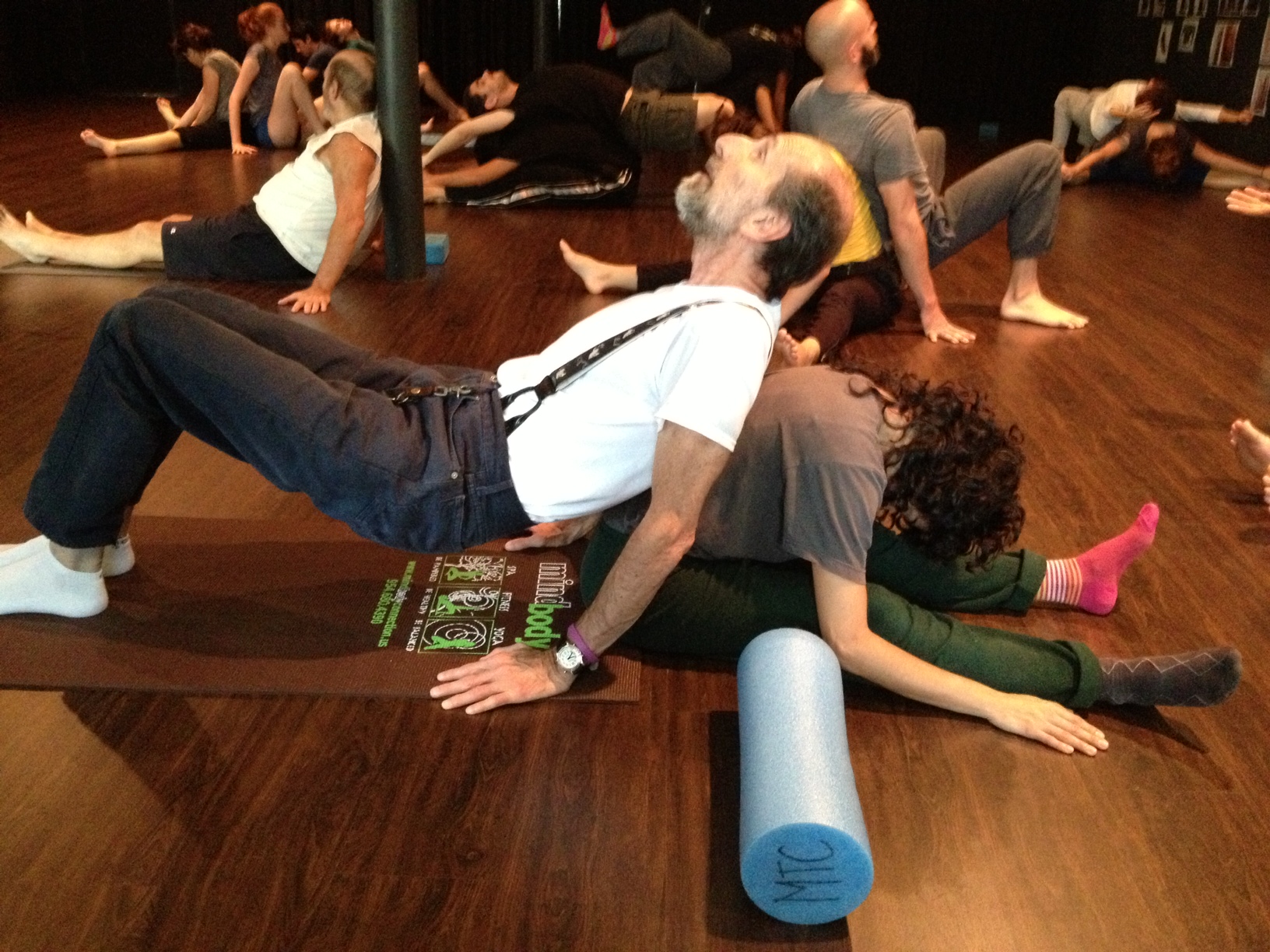Actors need to condition themselves, like an athlete, exercising and training to prep their mind and body for the work.
My day starts out at 9 a.m. with a series of exercises that loosen the limbs and voice, employing old school and new school techniques.


Being a blind guy, it becomes challenging to keep up with the various moves and positions being demonstrated by the leader. Thank Thespis for Ana! She is a petite, fit dancer who spots me and corrects my movements. We’ve gotten so good working together that our exercises resemble a choreographed dance.

Octavio, Resident Artist at Miami Theater Center, is the choreographer, movement and voice trainer for “Three Sisters.” With a larger than life presence and a smile to match, the salt and peppered Octi keeps us, the army of actors, in constant motion for 90 minutes, applying the “Sausage” – a mixture of movement, voice, theater and dance methods – yoga, GaGa (not Lady), Meyerhold's Bio Mechanics, FloorBarre, myriad voice techniques from Linklater and Grotowski, and basic composition tools developed by Anne Bogart.

So here I am lying on my back on my yoga mat attempting to strengthen my core and straighten my spine, a real good thing as I always have a tendency to lean a bit forward when I walk. I’m inclined to think this is a blind guy tendency, but my father who could see perfectly well had the same posture. Apparently, so did Abraham Lincoln.

We go from twisting every limb of our body, to crunches, to moving torso, head and legs like a toy, and then suddenly lying still and moving only one index finger to gather whatever information we can. (It is remarkable how much information you can receive through a finger.) We imagine our hands like feet, breathe in through one nostril and out the other, at times taking dragon breaths (short puffs of air in and out), float through “the lake” and climb up and down “the mountain,” all designed to distract us from our normal frame of consciousness and put us in touch with new feelings and perspectives. At one point I was actually flying, with of course, a little help from my friends.

The music of Tommy Dorsey, Bob Dylan, Petula Clark, Stevie Nicks, Mary Poppins and Madonna provide the soundtrack underscoring the drill. (When Madonna roars “Die b**ch!”, I’m crunching with a vengeance!)
Occasionally in the mix we lie quietly on our backs while Octi takes us on a guided meditation. This is my personal favorite.
Once our bodies are tuned up, we condition the brain with improv. The improvs, led by artistic director Stephanie and Octi, are situations that are set up to inform and help us discover useful things about our characters – it’s putting wood into the fireplace.
Speak and Repeat

One actor faces a second actor, the second speaking with the first actor’s character voice while making a specific movement, the first repeating and copying, and then they switch. I didn’t do so well copying the movements but kicked butt with the voice.
The Ghost
We might create an internal emotion and turn it into an emotionally charged action, then repeat the action without any vocal sounds, then without any facial expressions, finally moving the action into an empty gesture, becoming a ghost, rotating from full out action to ghost and back to action. This helped put us all at once on opposite ends of our characters being.
Swarming
One character sits in the hot seat while all the other dozen actors slowly approach them, speaking lines or thoughts from the play, saying something nice about them and then turning combative, elevating the noise to a fevered pitch until the actor in the hot seat stands and shouts: “Moscow!” which silences the chaos. This helps the actor in the seat to experience a wide range of emotions. (It probably was a bit curious to the UPS guy who showed up at the door during my turn.)
Shared Objects
We each brought in a favorite object and shared a story about it with another actor. Later that actor repeated your story – an excellent listening exercise. Ah, listening! The actors best tool in the toolkit.
Walk and Talk
Before we took the stage to rehearse the play, we all moved around the rehearsal room together, exploring the mock set and prop pieces while speaking our lines out loud. This helped break vocal and body patterns that might be forming prematurely as well as amplify the silence between the lines. Pauses during the play are essential, especially with Chekhov – it’s often what’s not being said that has real impact.
Shoe Training
With a period play, boots are abundant, and loud. We put on our footwear, and walked the stage like cat burglars, our legs absorbing the energy, the women running on the balls of their feet in their heels. This was to reduce any distracting noise we might make as we tripped the boards.
On to the rehearsal and opening night!







